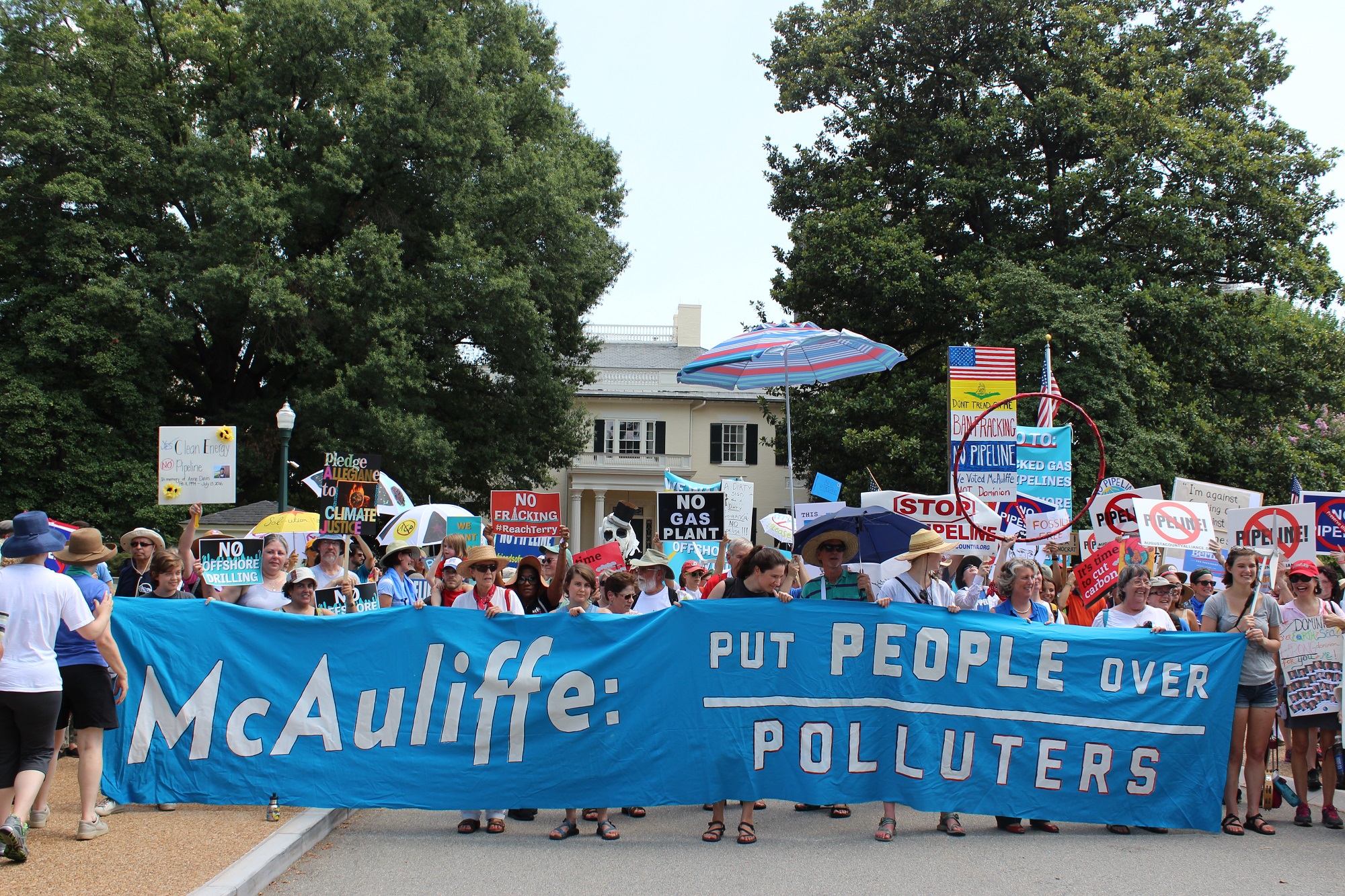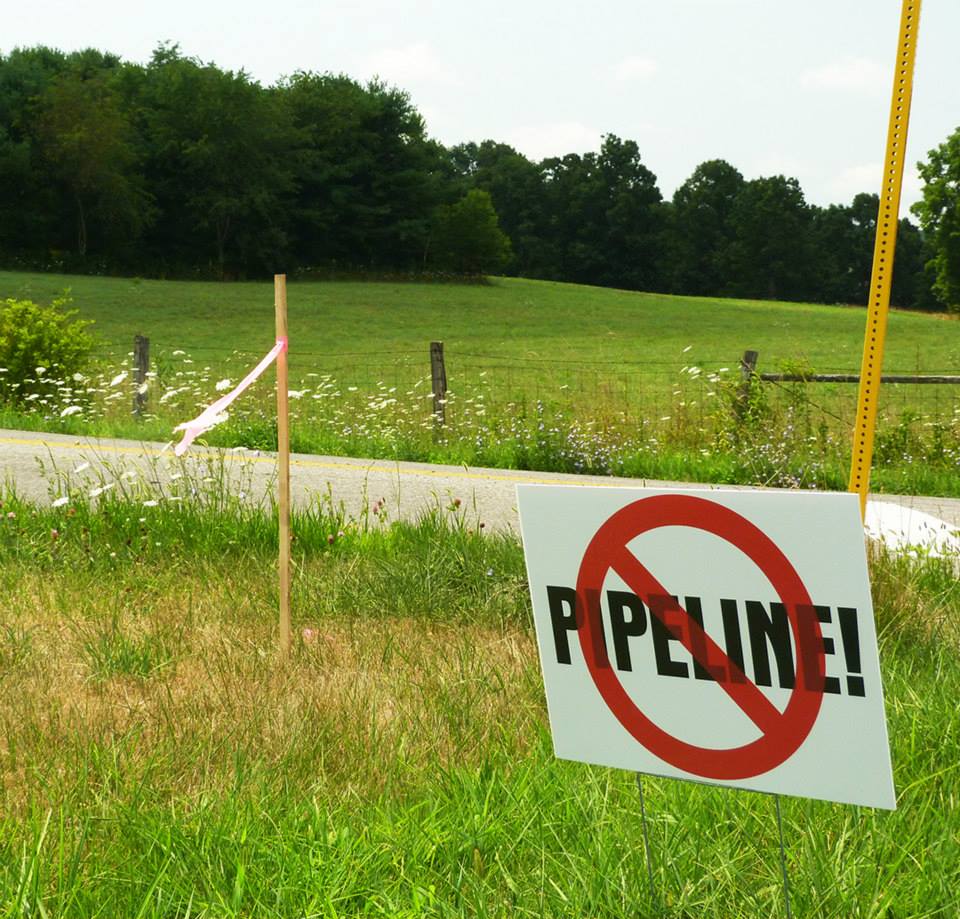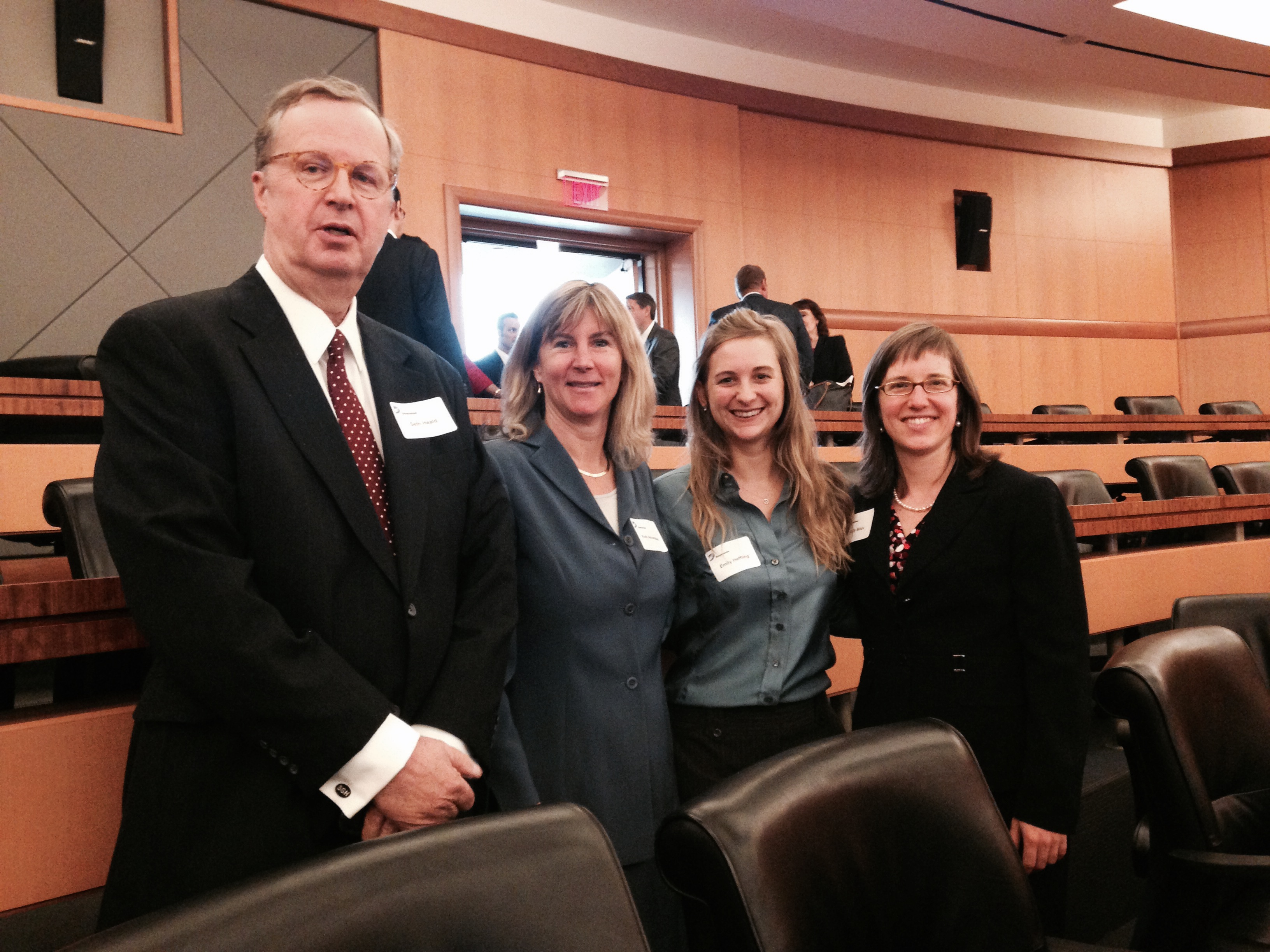As summer winds down, the battle over Virginia’s long-term solution for coal ash disposal is heating back up. This summer saw several significant events and improvements in the fight against reckless coal ash disposal in Virginia.
First, the Virginia Sierra Club and Southern Environmental Law Center teamed up in court to sue Dominion for violations of the Clean Water Act at its leaking Chesapeake coal ash ponds. The trial spanned 4 days in Richmond, at the end of which Judge Gibney said he was inclined to agree that arsenic was in fact leaking from the Chesapeake coal ash ponds and that Dominion was in violation of the Clean Water Act, but said he was not yet sure of a solution. He plans to rule on the case within the next few months.
This summer also saw the U.S. Environmental Protection Agency close a significant loophole in its coal ash rule. Previously, if utilities managed to close their inactive coal ash ponds within three years of the issuance of the rule, they would essentially escape all federal regulation. We speculate that this is why Dominion was moving so quickly–faster than almost all other utilities in the country–to close its inactive ponds. Thankfully, thanks to a lawsuit brought by Earthjustice and others, this loophole is now removed.
We view this as a significant win. Before this update, inactive coal ash ponds that closed early were not subject to any groundwater monitoring or other post-closure care requirements–basically, they were unregulated under federal law. Under this new rule, Dominion no longer has an incentive to meet the April 2018 closure deadline and, if it does, the company will still not be able to escape the full requirements of the coal ash rule. Dominion’s inactive ponds are now subject to monitoring and corrective action; groundwater contamination at the site is subject to strict cleanup standards; and these monitoring and cleanup requirements apply for 30 years after closure. We hope that this new EPA rule will result in Dominion giving more thought to its closure plans.
Despite these victories, there is still much work to be done. The next permit fight on the table is a dewatering permit for Dominion’s Chesterfield coal ash ponds. These ponds, which sit directly next to a playground and park, hold millions of tons of coal ash. They were shown to be leaking into the James River during a study conducted by Duke University earlier this summer.
This permit process goes before the Virginia State Water Control Board on September 22nd in Richmond, Virginia for a public hearing. The hearing will begin at 9:30 am at the General Assembly Building, House Room C (9th & Broad Streets) in Richmond. This permit still has serious deficiencies–from the high temperature of the released water to impacts to the endangered Atlantic Sturgeon habitat. We need Virginians to come together and show Dominion and state regulators that we demand a closure process that will protect our drinking water for decades to come, not Dominion shareholders’ bottom line. Especially as more southeastern states agree to excavate and move their coal ash to modern, lined landfills, or decide to recycle it–creating an economic windfall out of a toxic situation–Dominion lags farther and farther behind.
I’m hopeful on this campaign, friends. This summer hundreds gathered to march in 100* heat in Richmond to call on Governor McAuliffe to move us away from a future full of fossil fuels and dirty energy. To stand with Virginians, not with Dominion. Our movement is growing in Virginia and beyond. From the beautiful blockade against the Dakota Access Pipeline, to the unprecedented deployment of renewable energy across the globe, the tide is turning. We need your help to push us there.
Natural Gas in Virginia: Dominion’s proposed pipeline and how we can stand together to fight back
Update as of November 13th, 2014:On October 31st, Dominion Resources submitted a pre-filing request to FERC, the Federal Energy Regulatory Committee, which asks them to begin the environmental review of the pipeline. Landowners, community members, and activists around the state are continuing to mobilize and fight Dominion’s FERC requests at every step of the process. CCAN has partnered with local groups on the ground to launch a petition to Governor McAuliffe asking him to renounce his support of the pipeline. Our goal is 10,000 signatures–help us reach our goal and stop the Atlantic Coast Pipeline by signing here!
As of November 12th, Dominion gave final notice and threat to sue the 189 landowners along the path of pipeline who have not issued permission for Dominion to survey their land. If you have received a letter from Dominion and need more information, please contact: info@augustacountyalliance.org.
As Virginians, we’ve been fortunate enough so far to be free of fracking—the dangerous process of hydraulic fracturing for natural gas.
But just because we aren’t on top of the Marcellus Shale or Utica Shale basins, doesn’t mean we’re not connected with our neighbors battling fracking wells in their backyards, or that the dangers of our nation’s natural gas boom aren’t already threatening Virginia.
Dominion Resources recently partnered with Duke Energy, Piedmont Natural Gas, and AGL proposed a $5 billion, 550-mile pipeline that would cross through Virginia to connect natural gas production in West Virginia to consumption in North Carolina.
Starting in West Virginia, Dominion’s Atlantic-Coast Pipeline (previously known as the Reliability Pipeline) would enter through Highland County, heading into Nelson County and across the Shenandoah Valley on its way to North Carolina. The pipeline would also have an extension connecting to Hampton Roads. The proposed route would go through the George Washington National Forest and the backyards of Virginian families.
Leaks, explosions, and other accidents are not unlikely for a project of this scale, and hundreds of Nelson County residents raised their safety and environmental concerns last week at Dominion’s first public meeting in Nelson County.
Here’s a close up of the contested route, provided by groups helping to organize local residents to fight back:

I think a more reliable project wouldn’t include the risk of gas leaks and explosions. A smarter investment would be putting that $2 billion into energy efficiency, wind, and solar energy for our region.
Instead, it’s very clear that Dominion is moving too far, too fast towards natural gas, yet another dangerous fossil fuel — and one comprised mostly of methane, a powerful heat-trapping gas known to leak at high levels during the fracking process.
In fact, Dominion Virginia Power’s Integrated Resource Plan proposes 6-7 new fossil fuel plants in Virginia over the next 15 years, and Dominion Resources (DVP’s parent company) is fighting hard for a $3.8 billion liquefied natural gas export facility in Cove Point, Maryland. It’s clear that this pipeline is one major piece of Dominion’s region-wide push to keep us locked into climate-harming fracked gas for decades to come.
Unless we stop it.
Groups of concerned citizens across the Commonwealth are banding together to resist this pipeline—and to resist all dangerous, new natural gas pipelines and infrastructure that are a threat to our state.
Please check out the following organizations that are coordinating regional resistance to the pipeline and supporting homeowners along the proposed routes. Join their mailing lists for immediate updates on the pipeline routes as they continue to unfold:
Friends of Nelson County
- Serves Nelson County,VA
- An association of Nelson County residents, landowners and other concerned citizens who are opposed to the construction of the Dominion Southeast Reliability Pipeline crossing through Nelson County
- http://friendsofnelson.com/
- Like them on facebook: https://www.facebook.com/freenelson2 and https://www.facebook.com/No.Nelson.Pipeline
Shenandoah Valley Network
- Serves Augusta County, Frederick County, Page County, Rockingham County, Shenandoah County, Warren County
- Working to protect and sustain the rural landscapes, communities, and ecosystems of the Shenandoah Valley by working with strong local citizens’ groups, promoting smart local land use, and effective land protection strategies
- http://www.svnva.org/
Augusta County Alliance
- Serves Augusta County
- Dedicated to preserving the rural landscape, economy, clean air and water of Augusta county
- Currently sending “know your rights” letters to landowners along the pipeline route
- http://augustacountyalliance.org/
- Like them on facebook: https://www.facebook.com/AugustaCountyAlliance
Highlanders for Responsible Development
- Highland County, VA
- Highlanders for Responsible Development is a citizens’ group that promotes stewardship of Highland County’s unspoiled landscape, natural resources and exceptional quality of life. We support policies and activities that are based upon informed community discourse, democratic decision making, prudent land use and sustainable economic development.
- http://www.protecthighland.org
Visit us back here for more updates as they unfold. CCAN will be keeping all eyes on the pipeline route and the proposal process to make sure we inform supporters with the first opportunity for public comments and other actions we can take statewide to stop the pipeline.
For updates on the pipeline project: http://www.nelsoncounty-va.gov/pipeline-information-and-updates/
Challenging Dominion & Tom Farrell face to face
When I started working for CCAN almost two years ago, I never imagined that I would be shaking hands with Tom Farrell, Dominion’s CEO, and addressing the Board of Directors on the impact that climate change has on the Company. But that’s exactly what I did last week in Cleveland, Ohio, with a group of shareholders at Dominion Resources’ annual shareholder meeting.
This year was my first experience working on the inside to change Dominion’s energy portfolio, but Virginian shareholder activists have been submitting resolutions to Dominion Resources since 2011. Shareholders are people who own stock in Dominion Resources; unhappy shareholders are able to submit resolutions that seek to promote environmental, social, or governance changes from within a company. And for the past four years, Dominion shareholders have submitted resolutions pressuring the company to push towards clean, renewable energy, and to disclose more analysis on how climate change impacts the Company, customers, and investors.
Although a resolution itself can only be 500 words, the process that comes before presenting the resolutions at the annual meeting is a long, technical process, and often comes with facing Dominion’s legal team head on. Each resolution has to go through the official guidelines of the Securities and Exchange Commission–so for every resolution filed on climate change, we submitted supporting statements, rebuttals to counter Dominion’s challenges, and other documents hoping to convince the SEC to rule in our favor and persuade investors to vote for change.

And, I’m happy to report that all of the hard work this year paid off! At this year’s meeting, we received record-high support for each of our four climate-related resolutions. Here’s a rundown of the climate change resolutions, with the final vote counts:
- Financial Risks to Dominion Posed by Climate Change, 24%: Report to shareholders describing the financial risk to Dominion posed by climate change, specifically including the impact of more frequent and more intense storms, as well as any actions planned to address these risks.
- Methane Emissions, 21%: How is Dominion Resources is measuring, mitigating, setting reduction targets, and disclosing methane emissions? While Dominion Resources operates one of the largest natural gas storage and transportation systems in the U.S. and plans to significantly increase its investments in natural gas assets, the company has no system for reporting on, or thus minimizing, the risks to shareholders or the environment from its methane emissions.
- Environmental and Climate Change Impacts of Biomass, 21%: What are the environmental and climate change impacts of the company using biomass as a renewable energy and climate mitigation strategy?
- Quantitative Goals for Reducing Greenhouse Gas Emissions, 20%: Adopt quantitative goals for reducing greenhouse-gas emissions, taking into account International Panel on Climate Change guidance, from Dominion Resources Inc.’s products and operations.
In the past four years, shareholder activists have never seen across the board double digits of support. To put these numbers into perspective, the Climate Risk resolution, which received 24% of the vote, represented 80,695,951 votes. If you multiple that by $70 per share (the current cost of Dominion stock), that’s $5.65 billion worth of shares supporting the resolution.
As we’re coming off our celebratory high of this year’s meeting, we’re also planning on how to earn even more support, and make an even bigger imprint for next year’s meeting.
Do you own shares in Dominion or know someone who does? If so, and if you want to take part in changing corporate business models that disrupt our climate, email me at: Emily@chesapeakeclimate.org



